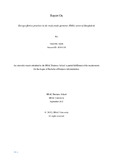| dc.contributor.advisor | Groh, Sebastian | |
| dc.contributor.author | Sakib, Shah Md. | |
| dc.date.accessioned | 2024-04-03T05:59:09Z | |
| dc.date.available | 2024-04-03T05:59:09Z | |
| dc.date.copyright | ©2023 | |
| dc.date.issued | 2023-09 | |
| dc.identifier.other | ID 19104130 | |
| dc.identifier.uri | http://hdl.handle.net/10361/22621 | |
| dc.description | This internship report is submitted in partial fulfillment of the requirements for the degree of Bachelor of Business Administration, 2023. | en_US |
| dc.description | Cataloged from PDF version of internship report. | |
| dc.description | Includes bibliographical references (pages 44-49). | |
| dc.description.abstract | The ready-made garments sector in Bangladesh is one of the leading industries to play a focal role in its economy. This report highlights two important factors improving the industry’s growth: energy efficient practices and sustainable marketing strategies. These key components are enhancing the economy and infrastructure in Bangladesh. Modern day innovations e.g., IoT-powered machinery and solar system are lowering power consumption and associating with the global sustainability goals. These modifications not only address ethical issues but also assure a more sustainable future, reflecting environmental challenges. In today’s world, marketing strategies in the RMG sector has advanced. Global partnerships, online promotions and campaigns has been necessary for connecting with the consumers. Despite that, manufacturing, supply chain issues persist. Energy-efficient initiatives save costs, lessens environmental degradation, and have the potentiality in saving millions of dollars. LEED certifications contribute to sustainability and efficient lighting improves the overall productivity of the factories. The RMG sector is a notable benefactor to Bangladesh’s economy, with continual setting up of factories and labor participation. Sustainability measures, efficient use of energy is shaping the industry. Lean practices have made possible cutting down the costs, improved productivity, and reduced waste. Systematic supply chains have upgraded logistics, with scheme like the PACT project playing part in water and energy savings. Even though the industry grew rapidly but minimum wage situation remains but with strategic investment and government initiatives Bangladesh can strengthen its position in the global RMG market. To broaden the industry worker protection, skilled labor, infrastructure development and value-based pricing should be given utmost priority. This will create a more sustainable and successful future for RMG sector in Bangladesh. | en_US |
| dc.description.statementofresponsibility | Shah Md. Sakib | |
| dc.format.extent | 49 pages | |
| dc.language.iso | en | en_US |
| dc.publisher | Brac University | en_US |
| dc.rights | Brac University internship reports are protected by copyright. They may be viewed from this source for any purpose, but reproduction or distribution in any format is prohibited without written permission. | |
| dc.subject | Energy-efficient practices | en_US |
| dc.subject | Ready-made garments | en_US |
| dc.subject.lcsh | Energy--Environmental aspects. | |
| dc.title | Energy-efficient practices in the ready-made garments (RMG) sector of Bangladesh | en_US |
| dc.type | Internship report | en_US |
| dc.contributor.department | Brac Business School, Brac University | |
| dc.description.degree | B. Business Administration | |

